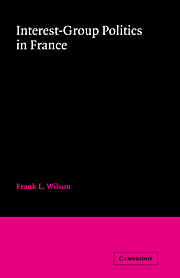Book contents
- Frontmatter
- Contents
- List of figures
- List of tables
- Acknowledgements
- 1 Introduction
- 2 Alternative views of interest-group politics in western democracies
- 3 Interest groups and politics: the non-occupational groups
- 4 Major interest groups: the occupational groups
- 5 Structures of interest-group politics
- 6 Interest-group actions
- 7 Interest-group leaders' attitudes toward interaction with government
- 8 The place of interest groups in French politics
- 9 The French experience and interest-group theory-building
- 10 Conclusions: interest groups and representative democracy in France
- Appendix A Questionnaire
- Appendix B List of groups included in interview sample
- Notes
- Index
4 - Major interest groups: the occupational groups
Published online by Cambridge University Press: 05 January 2012
- Frontmatter
- Contents
- List of figures
- List of tables
- Acknowledgements
- 1 Introduction
- 2 Alternative views of interest-group politics in western democracies
- 3 Interest groups and politics: the non-occupational groups
- 4 Major interest groups: the occupational groups
- 5 Structures of interest-group politics
- 6 Interest-group actions
- 7 Interest-group leaders' attitudes toward interaction with government
- 8 The place of interest groups in French politics
- 9 The French experience and interest-group theory-building
- 10 Conclusions: interest groups and representative democracy in France
- Appendix A Questionnaire
- Appendix B List of groups included in interview sample
- Notes
- Index
Summary
From the standpoint of size and influence, interest groups representing occupational sectors have been the most important in modern French politics. Shared socioeconomic interests and concerns of individuals engaged in the same economic activity give occupationally-based groups a large pool from which they can recruit members. The primacy of these groups comes from their size but also the multiple functions that they fulfill. Officially recognized by the state as its “social partners,” these occupational groups increasingly have been drawn into the political process as the state has expanded its role in managing the economy. Occupational groups not only represent the interests of their members to the state but they also serve as agents for interacting with each other in the economy and society whether or not the state is involved. They bargain over salaries, working conditions, status, and social relationships. The resulting accords have broad impact on society as a whole even if they lack the authoritative imprimatur of the state. Because these occupational groups are closely aligned with social classes they become the vehicles for often lively class conflict. For these reasons, it is appropriate to devote considerable attention to the organization and political strategies of the principal occupational interest groups.
Trade unions
The trade-union movement in France has faced a series of difficult obstacles that have obstructed its development: hesitant workers, with the minority that is interested more attracted to anarchism than to organized efforts; a strong syndicalist tradition that encouraged awaiting the mythical general strike and discouraged the building of ties between the labor movement and political parties or the state; ideological cold wars; bitter internal divisions among alternative labor unions; an unsympathetic state; and employers regarded as among the most reactionary in Europe.
- Type
- Chapter
- Information
- Interest-Group Politics in France , pp. 71 - 120Publisher: Cambridge University PressPrint publication year: 1988



